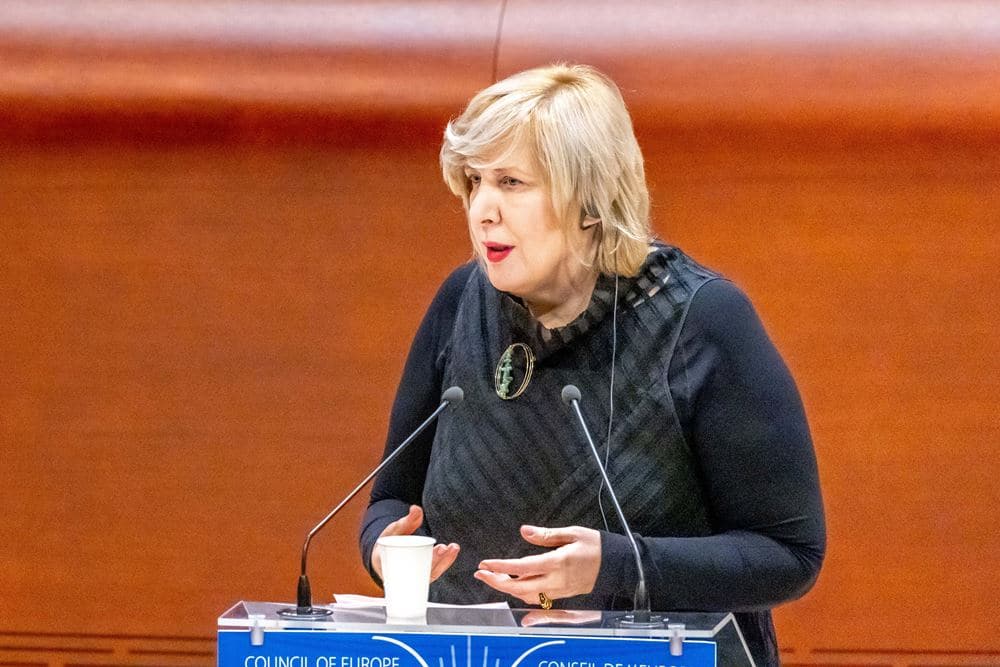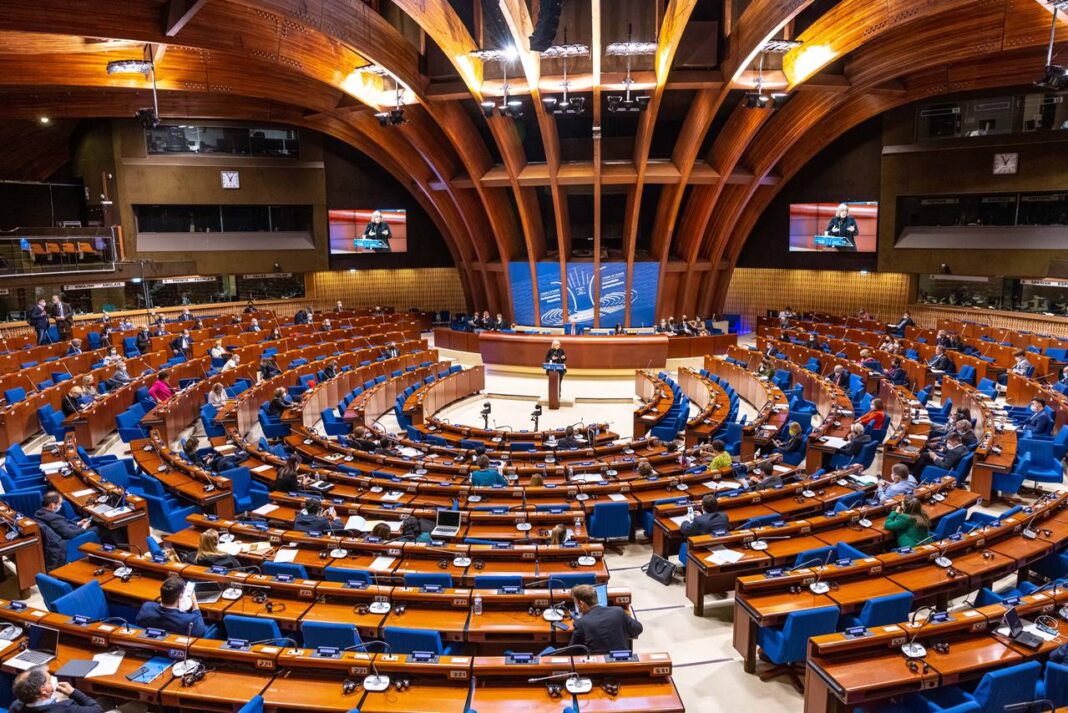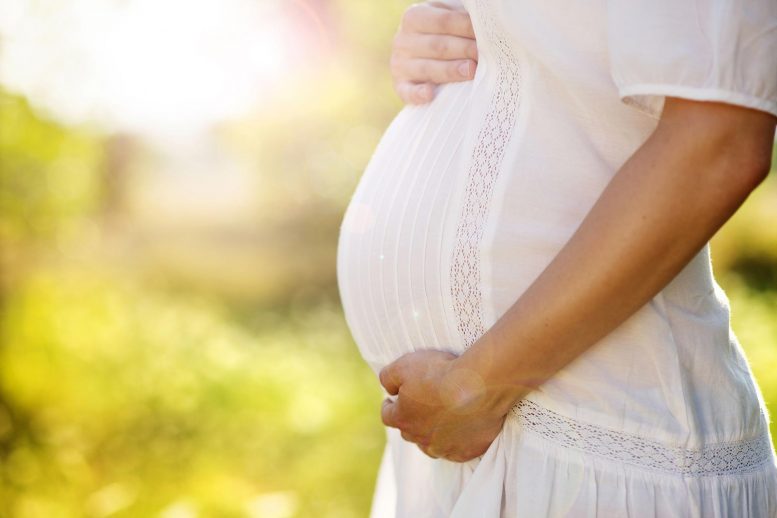The Council of Europe Commissioner for Human Rights, Dunja Mijatović, presented her annual report 2021 to the Parliamentary Assembly during the Assembly’s Spring Session in the end of April. The Commissioner stressed that trends undermining human rights protection have continued in 2021.
The topics covered by the report vary from media freedom and journalists’ safety to the protection of migrants, from freedom of peaceful assembly to the rights of women and girls, persons with disabilities, human rights defenders and children, as well as transitional justice*, the right to health, and racism.
“These trends are not new,” Ms Dunja Mijatović noted. “What is particularly alarming is the scale of retrogression on many human rights principles and the widespread undermining of the rule of law, which is a precondition for human rights protection.”
In her speech to the Parliamentary Assembly of the Council of Europe the Commissioner in particular addressed the consequences of the war in Ukraine. “During the last 61 days of war, Ukraine has been the scene of egregious human rights violations committed against the civilian population. The images of the lifeless bodies of civilians, brutally killed in cities and villages in Ukraine, have left us all speechless,” Ms Dunja Mijatović stated.
She added, “They provide a haunting illustration to shocking reports of violations of human rights and breaches of international humanitarian law, such as summary executions, abductions, torture, sexual violence, and attacks against civilian infrastructures, committed in areas of Ukraine previously under the control of Russian troops. To many of these violations, including those that have emerged in Bucha, Borodyanka, Trostianets, Kramatorsk and Mariupol, I reacted publicly.”
“This war and the blatant disregard for human life that it brings needs to stop. Every effort must go into preventing more atrocities. The terrible acts committed against the civilian populations may constitute war crimes and must not go unpunished. All of them must be documented and thoroughly investigated, and their perpetrators identified and brought to justice,” Ms Dunja Mijatović pointed out.
She hoped the European member states would continue to support the Ukrainian justice system, as well as the International Criminal Court, so that they can deliver a measure of justice and reparations to the victims.
She also called on governments and parliaments of member states to strengthen efforts to coordinate and scale up support for the response to the humanitarian and human rights needs of people fleeing the war in Ukraine with a medium and long-term perspective.
The Commissioner on Human Rights however also noted, that while the impact of the war on the human rights of those fleeing Ukraine and those remaining in the country has been the focus of her work in the last weeks, she has also continued to alert member states on other pressing human rights issues.

Free speech and participation threatened in some countries
She specifically pointed to a growing pressure on free speech and public participation in European member states. Many governments have become increasingly intolerant towards public demonstrations of dissent. Faced with the multiplication of protests, authorities in several countries have taken legal and other measures that limit people’s right to peaceful assembly and therefore their ability to express their views, including political ones, publicly and together with others.
She also observed a worrying retrogression in the safety of some human rights defenders and journalists and the increasingly restrictive environment affecting their ability to work in many places in Europe. They face a variety of reprisals, including judicial harassment, prosecution, unlawful deprivation of liberty, abusive checks and surveillance, smear campaigns, threats and intimidation. She stressed that legislation should protect freedom of expression, not undermine it.
Responsibility of parliamentarians
In addressing the parliamentarians of the Assembly and their responsibilities, Ms Dunja Mijatović noted: “The centrality of parliamentarians in underpinning the democratic institutions of our member states cannot be overstated. Your engagement for human rights can make a concrete difference in the lives of many people. Your actions and your words are powerful tools in that sense.”
She however also noted, that the actions and words of the parliamentarians “can also have negative consequences. All too often I have heard politicians both in governments and parliaments use their positions to advance racist, antisemitic, homophobic, misogynist or otherwise undemocratic ideas. More worryingly, in some countries prominent politicians and public figures are fanning the flames of nationalism and willfully sowing the seeds of hate.”
In consequence she stressed that “Instead of going down this path, politicians in Europe must exercise responsibility and lead by example in their public discourse and actions to promote peace, stability, dialogue and understanding. Instead of warmongering and spreading divisive propaganda, politicians should work towards improving inter-ethnic relations and ensuring that everyone’s rights are equally protected, in the Balkans, in Ukraine and elsewhere in Europe.”
Reform of mental health services
In the Commissioners Annual activities report of 2021 an impressive long list of actions is noted. These include the Commissioner continued intensive work concerning the rights of persons with disabilities.
The report stated that she particularly focused on the rights of persons with psychosocial disabilities, setting out her views on the much needed reform of mental health services in a Human Rights Comment dedicated to this issue that she published on 7 April 2021.
The Comment considering the devastating impact of the pandemic which had exposed and aggravated existing failings of mental health services throughout Europe, the Commissioner pointed to the various ways in which these services were continuing to cause numerous human rights violations, in particular when they are concentrated in closed psychiatric hospitals and where they rely on coercion.
The report also note, that the Commissioner was vocal in speaking out against institutions and coercion in psychiatry on several occasions, for example at a hearing organised by the Committee on Social Affairs, Health and Sustainable Development of the Parliamentary Assembly on deinstitutionalisation of persons with disabilities on 16 March 2021 and an event organised by Mental Health Europe on Shaping the future of community mental health services based on human rights on 11 May 2021. She also participated at a launch event organised by the World Health Organisation for its new guidance on community mental health services on 10 June 2021 and contributed a video message to the opening plenary session of the Global Mental Health Summit organised in Paris, France, on 5 October 2021.
She stressed that persons facing mental health problems must have access to recovery-oriented community mental health services which are provided on the basis of free and informed consent and which promote social inclusion and offer a range of rights-based treatments and psychosocial support options.
* Transitional justice is an approach to systematic or massive violations of human rights that both provides redress to victims and creates or enhances opportunities for the transformation of the political systems, conflicts, and other conditions that may have been at the root of the abuses.
Report









